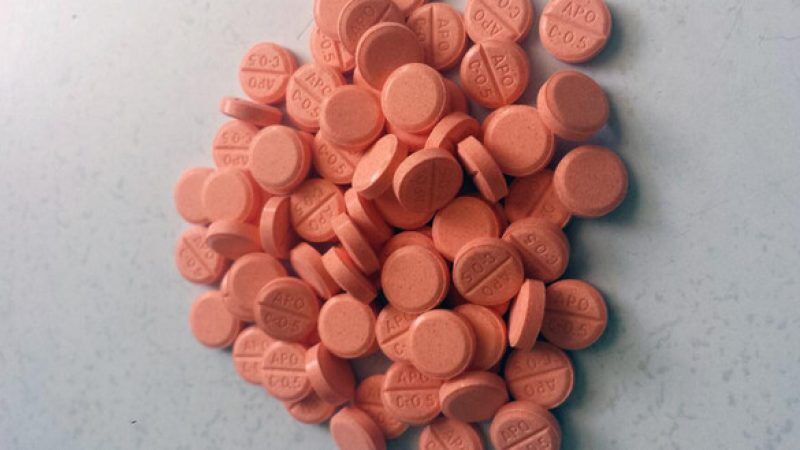Adderall is a stimulant medication primarily prescribed to treat Attention Deficit Hyperactivity Disorder, narcolepsy, or as an off-label treatment for depression. It contains a mixture of both amphetamine and dextroamphetamine. Its mechanism of action involves increasing dopamine and norepinephrine levels in specific brain areas associated with pleasure and focus. However, due to its ability to produce a sense of euphoria and increased productivity, the drug is widely abused.
Adderall Prescription Rates
Prescription rates for stimulants such as Adderall have been on the rise in the United States. A study conducted in 2021 revealed a significant 79% increase in the use of prescription stimulants among adults from 2013 to 2018.
Physical Signs of Adderall Addiction
- Increased tolerance
- Insomnia or disrupted sleep
- Unintended weight loss
- Sweating
- Frequent headaches
Behavioral Signs of Adderall Addiction
- Effort to acquire the drug
- Doctor shopping
- Neglecting responsibilities
- Increased secrecy and deception
- Engaging in risky behaviors
Emotional Signs of Adderall Addiction
- Irritability, agitation, and depression
- Heightened anxiety
- Paranoia or hallucinations
- Emotional instability
- Diminished motivation
Is Adderall a Narcotic?
The question of whether Adderall is classified as a narcotic often arises due to concerns about its addictive potential. It is important to understand that Adderall is not categorized as a narcotic. Instead, it is classified as a prescription stimulant medication. While Adderall does carry the risk of addiction when misused or taken without a valid prescription, it belongs to a distinct class of drugs known as amphetamines. Narcotics, on the other hand, specifically refer to substances derived from opium or synthetic compounds that mimic their effects. Examples of narcotics include opioids like morphine or heroin.
It is worth noting that, due to its high risk of misuse, Adderall is listed as a federally controlled Schedule II substance. This classification emphasizes the need for strict regulation and monitoring of its use to prevent potential abuse and addiction.
Is Adderall Addictive?
Adderall addiction is a significant concern that should not be overlooked. The truth is, yes, Adderall can be addictive, and understanding the risk of addiction to Adderall is crucial. In fact, statistics reveal that in 2012, over 116,000 individuals sought rehab treatment for an addiction to amphetamines like Adderall. While Adderall has legitimate uses when taken as directed, its abuse can lead to unnaturally high levels of dopamine, resulting in a pleasurable and euphoric sensation that the brain becomes dependent on.
As a result, users experience cravings for larger doses to maintain the desired effects, such as increased productivity, focus, or extended wakefulness. Over time, individuals may find it impossible to function without the drug, leading to extreme tiredness and depression when not using it. Obtaining an Adderall prescription is relatively easy, which contributes to the potential for abuse. Research indicates that college students, initially seeking to enhance their academic performance, face an increased risk of progressing to other forms of drug abuse.
Signs Of Adderall Addiction
Being aware of the warning signs and effects of Adderall addiction is crucial for individuals to understand their own usage patterns and seek help if needed.
Some common warning signs include:
- Exceeding prescribed dosage or using Adderall for an extended period beyond intended.
- Difficulty reducing or stopping Adderall use.
- Devoting excessive time to obtaining, using, or recovering from Adderall’s effects.
- Strong cravings for Adderall.
- Impaired performance in work, school, or personal responsibilities due to Adderall use.
- Experiencing social or interpersonal issues related to Adderall use.
- Neglecting previously enjoyed activities in favor of Adderall consumption.
- Engaging in risky situations while under the influence of Adderall.
- Persisting with Adderall use despite physical or psychological harm.
- Developing tolerance, requiring higher doses of Adderall to achieve previous effects.
- Experiencing withdrawal symptoms upon reducing or discontinuing Adderall use.
It is important to note that the timeline and severity of withdrawal symptoms can vary from person to person. Seeking medically managed withdrawal with the use of medications can help alleviate symptoms and reduce the risk of relapse.
Adderall Withdrawal Symptoms
Initial Withdrawal (First Few Days)
Rebound anxiety: A surge in anxiety levels due to the sudden absence of the calming effects provided by Adderall.
Sleep disturbances: Insomnia or disrupted sleep patterns may occur as the body adjusts to the absence of stimulant medication.
Mood swings: Fluctuations in mood, ranging from irritability and agitation to feelings of sadness or depression.
Fatigue and low energy: The body may experience fatigue as it readjusts to functioning without the stimulant effects of Adderall.
Increased appetite: As the appetite-suppressing effects of Adderall diminish, individuals may experience heightened hunger and potential weight gain.
Cravings for Adderall: Strong desires to use the drug may be present during this stage.
Continued Adjustment (First Week to a Few Weeks)
As individuals progress into the second stage of Adderall withdrawal, many of the symptoms from the initial stage may persist but gradually improve. The intensity of mood swings tends to decrease, allowing for more emotional stability. While fatigue may still be present, individuals may start to experience slight improvements in energy levels as their bodies adapt to functioning without the assistance of Adderall. Cravings for the drug may persist but become less frequent and intense over time. The appetite stabilizes, and the increased hunger experienced in the initial stage may begin to subside. Sleep patterns also tend to normalize, leading to better quality and more restful sleep.
Stabilization and Recovery (Beyond a Few Weeks)
In the third stage of Adderall withdrawal, individuals begin to stabilize and experience further improvements in various aspects of their well-being. Energy levels continue to normalize, with fatigue diminishing and individuals regaining their pre-Adderall energy levels. Cravings for Adderall become less frequent and more manageable, allowing individuals to have greater control over their impulses. Sleep patterns further improve, providing individuals with better quality sleep and enhanced restorative benefits. Emotionally, individuals experience greater stability as mood swings subside, contributing to a more consistent sense of well-being. Cognitive functioning and the ability to concentrate on tasks gradually improve, allowing individuals to regain their focus and mental clarity.
Adderall Long-Term Effects
Long-term use of Adderall can lead to various side effects that individuals should be aware of. Prolonged use of this medication has been associated with cardiovascular problems, including elevated blood pressure, irregular heartbeat, and a potential increased risk of cardiovascular events such as heart attacks.
- Mental health issues may arise, including heightened anxiety, mood swings, and, in rare cases, the development of psychotic symptoms.
- Sleep disorders can also emerge, with individuals experiencing difficulties falling asleep or disrupted sleep patterns.
- Gastrointestinal issues such as stomach pain and digestive problems may occur.
Long-term use of Adderall carries the risk of dependency, tolerance, and addiction, where individuals may develop a psychological dependence on the drug and require higher doses over time.
Adderall and Alcohol
The combination of Adderall and alcohol is strongly discouraged due to the potential dangers involved. Adderall, as a stimulant medication, is commonly prescribed for conditions like ADHD, while alcohol is a depressant.
When these substances are mixed, their effects can contradict each other, placing added stress on the body and potentially obscuring the symptoms of alcohol consumption. This can lead individuals to consume larger quantities of alcohol than they typically would, increasing the risk of alcohol poisoning and other harmful consequences.
Combining Adderall and alcohol can intensify the side effects of both substances, including heightened heart rate, dizziness, and impaired judgment.
Signs of Adderall Overdose
Learn the crucial signs of Adderall overdose to ensure timely detection and intervention during emergencies, which can potentially save lives.
Physical Signs of Adderall Overdose
- Excessive sweating
- Rapid or irregular heartbeat
- High blood pressure
- Chest pain or tightness
- Shortness of breath
Behavioral Signs of Adderall Overdose
- Agitation or restlessness
- Tremors or shaking
- Confusion or disorientation
- Seizures
- Hallucinations
How Long Does Adderall Last?
The duration of Adderall’s effects can vary depending on factors such as dosage, individual metabolism, and the specific formulation of the medication.
Generally, the immediate-release form of Adderall typically lasts around 4 to 6 hours, providing a relatively short-term effect. On the other hand, extended-release formulations, such as Adderall XR, can provide a longer duration of action, lasting up to 10 to 12 hours.
It is important to note that the effects of Adderall may gradually decrease as the drug is metabolized and eliminated from the body.
It is recommended to follow the prescribed dosage and timing provided by a healthcare professional to ensure the medication’s effectiveness and minimize the risk of side effects.
Does Adderall create eating disorders?
Adderall abuse can have a significant effect on individuals suffering from eating disorders. The drug can interfere with the natural physiological processes necessary for healthy weight management and alter levels of hormones that are important in maintaining a healthy appetite. It’s thought that Adderall may trigger feelings of anxiety or dysphoria which could lead to extreme restrictive behaviors such as anorexia nervosa or bulimia nervosa.
Adderall misuse in individuals with existing eating disorders may act as a form of self-medication and can have a numbing effect, temporarily cloaking any underlying emotions that may be driving their disordered behaviors.
This makes it difficult for those struggling with Adderall abuse and eating disorders to address the underlying issues without professional help.
Adderall Addiction Treatment in Boca Raton, Florida
Adderall addiction treatment involves a comprehensive approach that includes Adderall detox, inpatient rehab, holistic therapies, and ongoing support. Detoxification is the initial step to manage withdrawal symptoms and prepare individuals for further treatment. Inpatient rehab provides a structured environment with various therapies, such as individual counseling and cognitive-behavioral therapy (CBT), to address addiction’s psychological and behavioral aspects. Holistic approaches, like mindfulness practices and yoga, promote overall well-being. Ongoing support and aftercare services are crucial for maintaining sobriety and preventing relapse.



